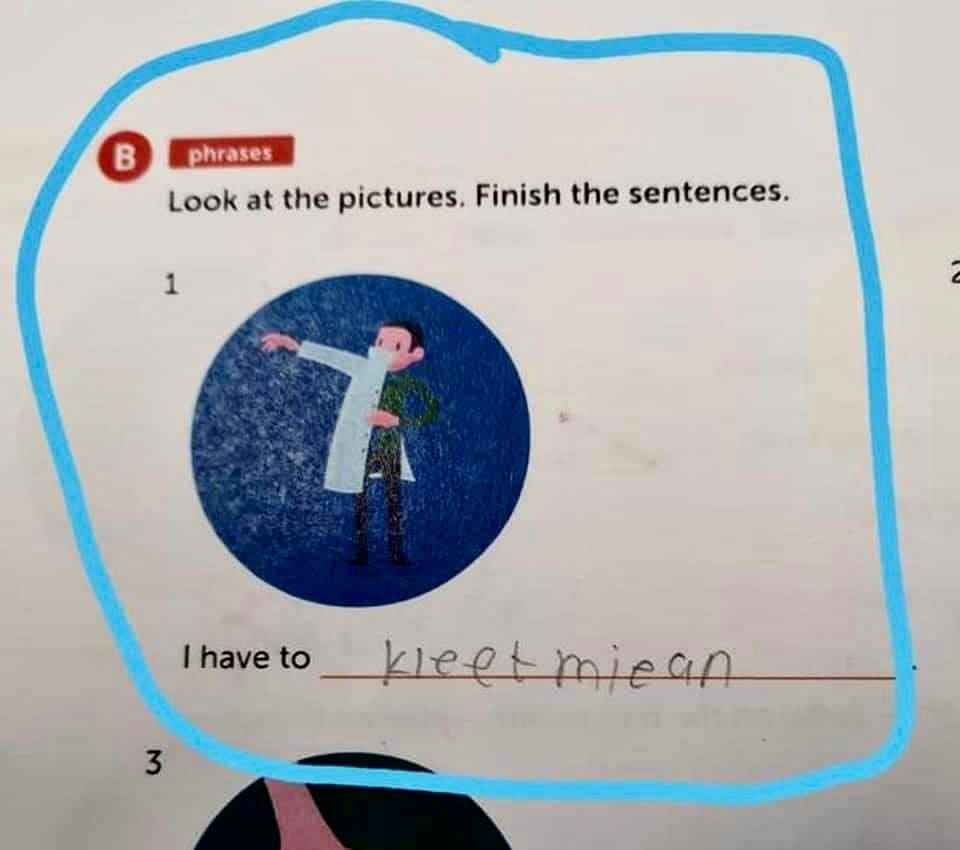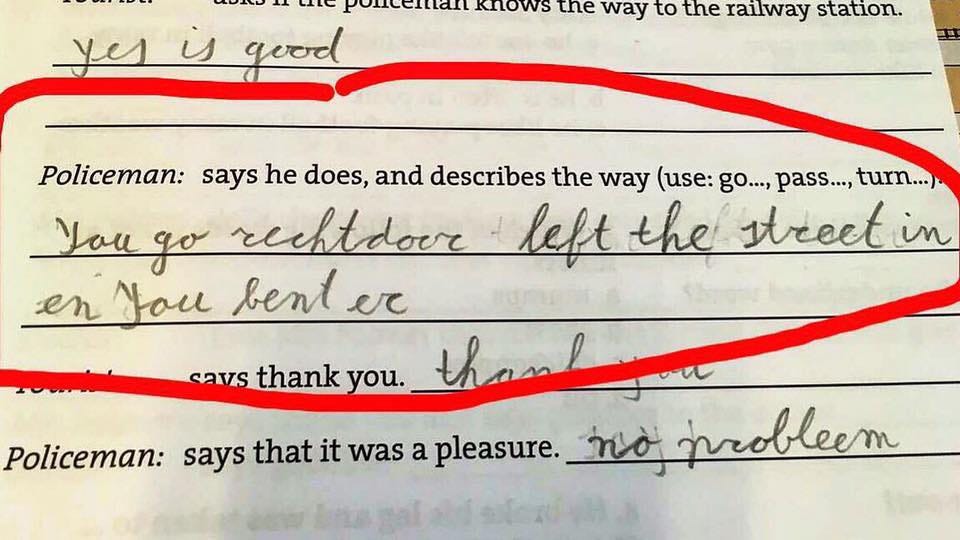Welcome to the latest instalment of English and the Dutch, the newsletter with tips and tricks, fun facts, new translations and other good stuff about how Dutch speakers speak English. In your inbox every second Wednesday.
The newsletter is written by me, Heddwen Newton. I also own the website www.hoezegjeinhetEngels.nl. If you are wondering where you signed up for this newsletter - that’s probably where you signed up for this newsletter. And if you have not yet signed up for this newsletter, you can do so right here:
Quiz
The idioms below all sound as if they have been translated too literally from Dutch. However, four of them are fine in English. Which ones?
This is a hole in the market
He who laughs last, laughs best
In the end, he chose eggs for his money
Come on, time to cut the knot
This project has many feet in the earth
Prevention is better than cure
Answers below!
Picture quiz
This UK(!) webshop makes a mistake that is usually very typical of Dutch speakers. What is the mistake?
Fun fact
There’s a viral language “fact” in English that isn’t actually true. It goes like this:
Jealous means fearing someone will take what you have, and envious means desiring what someone else has.
The statement also feels true for Dutch speakers, I think, because we have “jaloers”, “benijden” and “afgunst”. However, lexicographers at Merriam-Webster, America’s most renowned dictionary, took a good look at this claim and found it not to be true.
In almost all cases, “jealousy” and “envy” are synonyms, with “envy” being the more formal and less used of the two. The only exception: you can’t use “envious” when you are “possessively suspicious”, for example in a romantic relationship.
This is good news for Dutch people who tend to always use the word “jealous” because it sounds like “jaloers”. No problem, this translation is fine!
(The article I wrote about this back in January includes a Simpsons clip to showcase how strongly this incorrect piece of knowledge has become embedded in the English-speaking world. If it’s on the Simpsons, then it’s everywhere!)
Dutch/English in the news
Dutch government looking to curb English-language university courses
There was so much news about Dutch minister Dijkgraaf wanting Dutch universities to curb (= in toom houden) English and promote Dutch that it made me a bit dizzy and confused, also because I felt many articles contradicted each other. Here is a Dutch article from NRC that tries to get to the bottom of things. Here is science historian Hieke Huistra who is cautiously optimistic. My featured article is from The Guardian, which ends with “[this may be] a great opportunity for British or Swedish universities!” That’s a bit ominous for the Netherlands…
Reading time: 4 minutes / The Guardian
Gebruik Engels als academisch taal, niets fout met dat!
All the hoo-ha led Dutch satirical publication De Speld to republish a 2017 article about how English does not affect Dutch at all.
“Als je spreekt Engels, je kan werken overal ter wereld. Periode.”
Reading time: 2 minutes / De Speld
British five-year-olds are on average seven centimetres shorter than their Dutch counterparts
UK tabloid The Daily Mail is SHOCKED and APPALLED at this statistic. I found childhood obesity in the UK, discussed a little further down in the article, more shocking.
Reading time: 4 minutes / Daily Mail
Your Belgian news here?
I am very aware that Dutch is also spoken in Belgium, and I aim to have at least one Dutch-meets-English bit of news for my Belgian readers in each issue. But I can hardly ever find any. If you ever come across a great article, let me know!
Recent translations
Onwennig
I found another one! A Dutch word that does not have a single satisfying translation in English. “Onwennig” means you feel awkward in a new situation, but none of the potential translations (e.g. awkward, ill at ease, unaccustomed) manage to capture both the awkwardness and the newness at once. More here.
Aanwezig zijn
I always struggle when I want to talk about someone being “aanwezig” in the Dutch sense of being perhaps-a-little-annoying-but-you-don’t-want-to-say-it-that-directly. “To be present” never felt right to me. After looking at some real-world English I decided I was right, “to be present” has a positive connotation in English. “Difficult to ignore” comes closer to the Dutch sentiment, I reckon. Feel free to disagree here.
Out of the box
Fellow-Welsh-name-haver Mair (rhymes with fire) alerted me to the fact that “out of the box” has a meaning in English that Dutch speakers are not aware of: something that works straight away. (“This software works out of the box.”)
English speakers also use “out of the box” in the Dutch way, as a way to refer to “outside-the-box thinking”. But it is good to be aware that many native speakers will understand an “out-of-the-box solution” to mean a solution that will work immediately after implementation, rather than a creative, original solution.
To make life even more confusing, “out of the box” is slang in Australia for marvellous. “That party was out of the box”. More here.
Elkaar aanvullen
One where I suddenly started doubting my Dutch. Am I right in thinking you can say “we kunnen elkaar aanvullen” in Dutch when we talk about filling in gaps in each other’s knowledge while in conversation with a third party? Let me know here.
De knop omzetten
A tricky question from a website visitor. “De knop omzetten” is usually translated literally as “to flip the switch”. But in my opinion “to change your mindset” is often a better choice.
Dutch is pretty varied in its use of “de knop omzetten”. I got myself into trouble when I found the Dutch sentence “Na zoveel jaar kan ik de knop aardig omzetten. Maar het verdriet blijft.” This lady isn’t flipping a switch or changing her mindset, she is focusing on the here and now. Let me know if you can think of a better translation here.
Onderbouwen
I’m going against the dictionary with this one. I don’t agree with the translation “to underpin”. Instead, I think it should be “explain your reasoning” or “provide evidence”. More here.
Quiz answers
These sentences are fine in English:
He who laughs last, laughs best
Prevention is better than cure
Click on the sentences for a discussion of the term, and (where necessary) proof that they truly are used this way in normal English.
This sentence is fine, but means something different:
An English speaker will either interpret this as meaning “time to get divorced” or “time to find an easy, short-cut solution to an impossible problem”. More info here.
These sentences are not:
In the end, he chose eggs for his money
This project has many feet in the earth
Click on the sentences to find out how you can say this in English so that people will understand what you mean.
Picture quiz
A plural never gets an apostrophe in English, even after an abbreviation (= afkorting), even when writing in all caps (= hoofdletters) . It should read DVDS & BOX-SETS. More here.
Summer schedule
This summer, my two-week schedule will go down to a three-week schedule to accommodate our cycling holiday and various visits from and to friends (yay!). You can expect the next issues on 26 July and 16 August.
And finally…
For the first time in the history of this newsletter (which goes all the way back to late January 2023), nothing crossed my path in the past two weeks that would make a good “And finally”.
So I’m posting some pictures that primary school teacher Meester Mark posted on his Facebook.
(I have a half-baked philosophy about posting English mistakes by Dutch speakers. If you are the kind of person who has opinions about things, do let me know what your opinion is on this, because I’m waffling.)
If you found any mistakes in this newsletter: I made them on purpose to check you were paying attention. Reply to this email, or leave a comment to tell me about it. That way, next time, I won’t check that you were paying attention in that particular way again. Cheers!
Thanks!












Love your newsletter! The only one I read… from cover to cover? Hee, zomaar opeens weer een taalvraag, eigenlijk! 😂 Voor email kun je dat natuurlijk niet zeggen, niet in het Nederlands en niet in het Engels…. Dan maar gewoon: “helemaal” of “van begin tot eind”, denk ik. Ieg complimenten voor de nieuwsbrief.